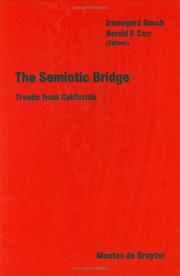| Listing 1 - 10 of 23 | << page >> |
Sort by
|

ISBN: 2012430201 9782012430204 Year: 1999 Publisher: Paris: Hachette,
Abstract | Keywords | Export | Availability | Bookmark
 Loading...
Loading...Choose an application
- Reference Manager
- EndNote
- RefWorks (Direct export to RefWorks)

ISBN: 3110116731 Year: 1989 Publisher: Berlin Mouton de Gruyter
Abstract | Keywords | Export | Availability | Bookmark
 Loading...
Loading...Choose an application
- Reference Manager
- EndNote
- RefWorks (Direct export to RefWorks)

ISBN: 0253184967 9780253184962 Year: 1980 Publisher: Bloomington, Ind.: Indiana university press,
Abstract | Keywords | Export | Availability | Bookmark
 Loading...
Loading...Choose an application
- Reference Manager
- EndNote
- RefWorks (Direct export to RefWorks)
Semiotics --- Language and languages --- Linguistics --- Congresses --- -Linguistics --- -Semiotics --- -Semeiotics --- Semiology (Linguistics) --- Semantics --- Signs and symbols --- Structuralism (Literary analysis) --- Linguistic science --- Science of language --- Foreign languages --- Languages --- Anthropology --- Communication --- Ethnology --- Information theory --- Meaning (Psychology) --- Philology --- Conferences - Meetings --- -Congresses --- Semiotics - Congresses --- Language and languages - Congresses --- Linguistics - Congresses

ISBN: 3110130009 3110856441 9783110130003 Year: 1992 Volume: 68 Publisher: Berlin: de Gruyter,
Abstract | Keywords | Export | Availability | Bookmark
 Loading...
Loading...Choose an application
- Reference Manager
- EndNote
- RefWorks (Direct export to RefWorks)
Germanic languages. --- Germanic languages --- Linguistics --- Research. --- Methodology. --- Langues germaniques --- Linguistique --- Research --- Methodology --- Recherche --- Méthodologie --- Teutonic languages --- Indo-European languages --- Germanic languages - Research. --- Linguistics - Methodology.

ISBN: 3110143593 3110148544 3110810867 9783110148541 9783110143591 Year: 1995 Volume: 83,94 Publisher: Berlin: de Gruyter,
Abstract | Keywords | Export | Availability | Bookmark
 Loading...
Loading...Choose an application
- Reference Manager
- EndNote
- RefWorks (Direct export to RefWorks)
No detailed description available for "Methodology in Transition".
Germanic languages --- Linguistics --- Grammar. --- Methodology. --- Grammar --- Langues germaniques --- Linguistique --- Methodology --- Grammaire --- Méthodologie --- Germanic languages - Grammar. --- Linguistics - Methodology.
Book
ISBN: 0253051665 Year: 1980 Publisher: Indiana University Press
Abstract | Keywords | Export | Availability | Bookmark
 Loading...
Loading...Choose an application
- Reference Manager
- EndNote
- RefWorks (Direct export to RefWorks)
The boundaries between linguistics and the various humane sciences— philosophy, psychology, anthropology—continue to shrink, and at the same time the two disciplines of linguistics and semiotics are being brought into direct contact with each other. It is the exploration of this interface that concerns Irmengard Rauch in the opening chapter, "What Is Signifying?" The remaining thirteen essays consider all aspects of language as semiotic act in six major topic divisions: definition of language; the pragmatics, semantics, and syntax of the language act; the Peircean categories of Firstness, Secondness, and Thirdness; language in relation to nonverbal communication; the language-likeness in animate existence; and the intersection of linguistics and semiotics. The contributors to this volume are William P. Alston, Raimo Anttila, John N. Deely, William Orr Dingwall, Paul Ekman, Robert B. Lees, David McNeill, Charles E. Osgood, Roland Posner, Joseph Ransdell, Irmengard Rauch, David Savan, and Rulon S. Wells.
Semiotics. --- Linguistics. --- Language and languages. --- Linguistique --- Langage et langues --- Semiotique --- Linguistics --- Language and languages --- Semiotics --- Foreign languages --- Languages --- Anthropology --- Communication --- Ethnology --- Information theory --- Meaning (Psychology) --- Philology --- Linguistic science --- Science of language --- Semeiotics --- Semiology (Linguistics) --- Semantics --- Signs and symbols --- Structuralism (Literary analysis) --- Literary theory
Book
ISBN: 0253054257 Year: 1983 Publisher: Indiana University Press
Abstract | Keywords | Export | Availability | Bookmark
 Loading...
Loading...Choose an application
- Reference Manager
- EndNote
- RefWorks (Direct export to RefWorks)
The elusive study of language change deals with discernible realia, such as sounds or structured groups of sounds, or words with their intra- and interrelationships. But these empirial data are constantly changing, and even interpreting them may be influenced by new linguistic circumstances. Description of language change has the advantage of hard evidence, but uncovering the reasons behind a set of language data is not a secure task. Language Change investigates the many facets of human activity that bear on this complex field. It relies on the polar areas of phonology, with its immediate alliance to physiology and physics, and semantics, with its penetration into the meaning of the world at large. Irmengard Rauch and Gerald F. Carr have organized the volume in four sections—Contemporary Change, Historical Change, Linguists on Language Change, and Strata and Language Change—with almost half the chapters offering contemporary data.The distinguished contributors are Barbara Greim, Wayne Harbert, Henry and Renee KahaneI, Ilse Lehist, Winfred P. Lehmann, David Lightfoot, Yakov Malkiel, Raven McDavid Jr., Els Oksaar, Edgar Polome, Irmengard Rauch, and Frans VanCoetsem. Their range of topics reflects the kaleidoscopic essence of language change itself and will be of falue not only to linguists and semioticians but to historians, sociologists, philosophers, and anthropologists as well.
Aufsatzsammlung --- Sprachwandel --- Taalverandering. --- Linguistic change. --- Changement linguistique --- Congres. --- Change, Linguistic --- Language change --- Historical linguistics --- Language and languages --- Linguistics

ISBN: 0820455148 Year: 2002 Publisher: New York (N.Y.) : Lang,
Abstract | Keywords | Export | Availability | Bookmark
 Loading...
Loading...Choose an application
- Reference Manager
- EndNote
- RefWorks (Direct export to RefWorks)

ISBN: 9783110810868 3110810867 3110143593 9783110143591 3110148544 9783110148541 Year: 1995 Publisher: Berlin Mouton de Gruyter
Abstract | Keywords | Export | Availability | Bookmark
 Loading...
Loading...Choose an application
- Reference Manager
- EndNote
- RefWorks (Direct export to RefWorks)
Book
Abstract | Keywords | Export | Availability | Bookmark
 Loading...
Loading...Choose an application
- Reference Manager
- EndNote
- RefWorks (Direct export to RefWorks)
| Listing 1 - 10 of 23 | << page >> |
Sort by
|

 Search
Search Feedback
Feedback About UniCat
About UniCat  Help
Help News
News